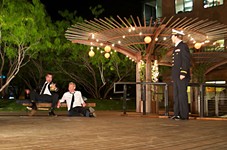Smells Like Team Spirit
National Poetry Slam Comes to Austin
By Spike Gillespie, Fri., Aug. 14, 1998
|
|
Mike Henry, 30-year-old co-owner of the Electric Lounge, is sitting in the darkened main room of his club, looking a little like Mr. Clean with his shaved head and matching hoop earrings. It's daytime now, and there is no need to shout as no band is playing, no one is in the place except for him, me, and a couple of dogs, and the huge neon stage sign: ELECTRIC, is neither buzzing nor glaring. Henry's soft tone, though, cannot conceal his passion about the upcoming National Poetry Slam, happening August 19-22. Not only will Henry's venue be one of seven involved in this event, which will culminate at (and is expected to fill) the Paramount Theatre, but he is co-director of the affair, along with Phil West and San Francisco-based poetry organizer Juliette Torrez. Both West and Henry have competed in past years' nationals, Henry has also coached previous teams, and each is intimately familiar with the thrill of poetry of the/by the/for the ... "My favorite part of the slam is that it embodies every artist's pursuit: It's a tangible channel to see if you are reaching people," says Henry.
Adds West, "This is the best that slam gets. You've got teams rehearsing for three or four months, doing several practices a week, writing and choreographing group pieces - all for anywhere from six to 12 minutes of stage time a poet. Everyone here has had to compete in their own cities to get on teams, and although the slam community is a giant, randy crowd here for summer camp, you can bet that teams are going to do everything they can to outdo each other."
Poetry slams are, for the record, a far, far cry from stuffy, quiet, sometimes agonizing "serious" poetry readings. Which is not to say they can't be serious. Started 11 years ago by Marc Smith at the Green Mill Tavern in Chicago, these audience-participatory celebrations have grown wildly, not yet peaking.
During weekly and monthly slams around the country, anyone with material can compete. Often greenhorns go up against seasoned veterans, and truly offensive material is read back-to-back with stuff so beautiful that stunned silence falls over a room more typically associated with ear-plugs-required rock. The rules and regulations are curious. Pieces must be no longer than three minutes. Judges - selected randomly from the audience - score based on their feelings rather than any set credentials. Explains Henry, "Judges could be other poets or they could be people who wander into the bar and who've never thought about poetry before in their lives."
The audience is encouraged to shout, clap, boo, and bang on tables while poets read. On top of that pressure, there is the ongoing, often irreverant commentary provided by the emcee. When Wammo officially retired as the grand poobah of weekly slams a couple of years ago, Genevieve Van Cleve and Phil West took over duties, alternating Tuesday night hosting shifts along with Mike Henry. As scores are tallied for each poet, Van Cleve or West will banter with the disembodied, God-like voice of Henry, booming retorts from his favored position back in the soundbooth. Whether discussing a piece just heard or rambling randomly on, say, diarrhea, more than once these improv wordslings have turned the rare slow night into an unforgettable evening. (Who among us, lucky enough to have witnessed it, will ever forget Van Cleve playing "The 1812 Overture" by banging her forehead on the mike?)
Slams are nervewracking, to say the least, and each performer's potential for the jitters is still further enhanced by the fact they are being judged on delivery and content. Brilliant wordsmiths have suffered crushing losses at times, when pitted against those less strong lyrically but powerful in the arena of dramatic delivery. Still, content must have some weight to win points. To that end, the narrative style is most preferred, and audiences can count on hearing deeply personal and cathartic rants on topics ranging from the humorous (a date gone awry, a parody of television) to the gravely serious (human rights, racism).
"I've heard/seen extremely lyrical, academic pieces kill at slams," concedes Henry. "But generally, narrative-based is easier for the audience. There's an extreme personal attachment. It's about laying it on the line and hoping that Shappy isn't within 10 miles of the building," he adds, referring to Chicago artist Shappy, who is one of the top slammers in the nation (Attention Shappy groupies: Shappy will be in the building for the Nationals!) So enrapturing is the Shap-man - with such glistening metaphors as his likening of labia to raw and flapping Steak-umms - that during his South by Southwest Showcase earlier this year at Mojo's Daily Grind, the packed house demanded four encores.
Recently, Slam Nation, a documentary by Paul Devlin, was released. It, too, played to full houses during SXSW, and the live audiences at the screenings cheered as loudly as the audience captured at the 1996 National Slam in Portland. That year, Austin poets Phil West, Danny Solis, Hilary Thomas, and Wammo took fourth place. (They were robbed.)
As things heat up and move to the national level, stakes grow higher, nerves more raw, and above all else, material and performance peak at awe-inspiring levels. During the Austin Slam-Off in May, to determine this year's national team, you could hear the sweat drop as poet after poet took the stage and delivered pieces that had worked best for them at earlier slams. Ultimately, Ernie Cline, Susan B. Anthony Somers-Willet, Genevieve Van Cleve, and Karyna McGlynn beat six others to take top honors. Since then, they've been taking part in a grueling rehearsal schedule, perfecting their individual pieces and hashing out how to best present ensemble works.
The Austin team will go up against such tough previous arch-rivals as San Francisco and Albuquerque. In all, 45 teams of four from around the U.S. and Canada will descend upon our city to vie for awards in both individual and team competitions. The necessary elimination rounds pose a need for intense choreography and self-policing to ensure poets do not repeat their most stunning works to advance. Only four teams will make it to the Paramount finale, where awards will be handed out to individuals and teams, with top prize being $2,000.
Having the National Poetry Slam play Austin is a unique opportunity to experience not only how intense a slam can be, but how particularly intense it can be with the very best competitors of all taking part. Even those who have been watching and competing for years are taken by surprise by the possibilities. Remembers Henry, "The first year Austin went to the Nationals, we were watching the finals and rooting for the Asheville, North Carolina, team. Danny Solis (who went on to be on a later Austin team and who will compete this year on the Albuquerque team) was on that team at the time and they performed an ensemble piece he wrote, a very political piece. Phil West was sitting next to me and he literally hyperventilated - the piece was that moving. Genevieve was sitting on his other side. All she could say to him was, `Hey Phil, you want some gum?' And Phil said, `That would be good.' It was all we could say. Beyond that, we were speechless."
Retired slammer Spike Gillespie will read her greatest slam hits during the day portion of the National Poetry Slam. Aug. 21, at Fringeware, along with Doug Martin and others, 3:30-4:30pm.









